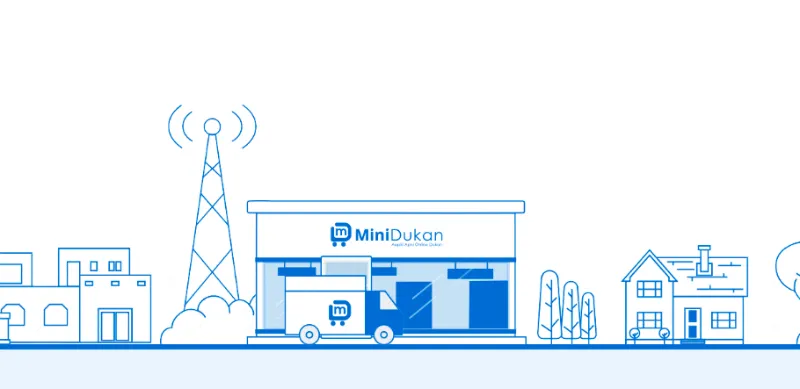Serial entrepreneur places his bets on ecommerce in India's heartland with MiniDukan
Founder Jitender Singh says the next decade will be big for rural ecommerce consumers as low data costs and higher awareness lead them to buy online.
When ecommerce websites started out a decade ago, it was largely an urban phenomenon. Over the years, shopping online became a favourite with India but has mostly remained confined to larger cities and towns.
Ecommerce majors Flipkart and Amazon currently deliver to more than 15,000 pin codes across 56 cities and 1,000 towns, but there is an India beyond that. There are over 7,900 towns and thousands of villages in the country and Jitender Singh saw this as his big opportunity.
Jitender started MiniDukan in June 2018 to focus entirely on rural ecommerce. While the company is not very different from other ecommerce platforms like Flipkart and Amazon, what sets it apart is that it only focuses on small towns and rural India.

MiniDukan’s vision, Jitendra says, is to revolutionise the ecommerce business in rural India. The hyperlocal service enables customers from small towns and villages to shop for products ranging from general merchandise and fashion to electronics. “MiniDukan offers an enhanced customer experience with deliveries at zero charges and no Minimum Order Value. The app plus kiosk-based hyperlocal service sources products from vendors and ensures delivery within 48-96 hours,” says Jitender.
Within six months of its launch, the company has a presence across 11 districts in Uttar Pradesh, 20 logistics warehouses, 2,500 collection delivery centres, or kiosks, and a customer base close to a lakh.
Second innings
Having started his career in the FMCG industry in 1997, Jitender worked with several companies until 2011. He founded a banking solutions startup in 2013 but it was a difficult experience. He then pivoted the business model and his startup went on to become one of the largest banking correspondents to State Bank of India in north India with Customer Service Points across 11 states catering to millions of customers. “I exited the company in 2018 when it was acquired by BLS E-services Pvt Ltd,” he says.
For his next entrepreneurial foray, Jitender went about to solve a problem that well-funded ecommerce companies could not – an ecommerce site for the next 400 million rural customers. He invested Rs 7 crore to start the business.
The Delhi-based company has a team size of 50 spread across managing logistics, vendor retention, and timely payments using technology, as well as employment generation and customer education.
Jitender claims that they have reached 60,000 customers to date. “Clients return to our platform time and time again because of the smooth experience we provide. Apart from our clients, we also ensure that entrepreneurs looking to start their own business within their locality and vendors looking to sell their products on the platform have a smooth experience on it.”
Opportunities and vision for MiniDukan
For MiniDukan the main challenge is to manage cash collections, and going forward, ensure that debit card or online payments increase.

In 2019, MiniDukan aims to have 40,000 collection delivery centres across North India, 400 warehouses and a customer base of 10 million. MiniDukan did not disclose the number of vendors on the platform but sources say it has more than 5,000 vendors.
“We have attempted to enhance the user experience by eliminating the minimum order value and facilitating delivery in time,” says Jitender.
The company also is encouraging entrepreneurs to sell on the platform. “We aim at empowering youth in rural India by enabling them to make a livelihood out of this business model. We intend to duplicate this model across women self-help groups, thus creating a women entrepreneurship model in India. I firmly believe that there is no tool for development more effective than the empowerment of women,” says Jitender. He says it is too early to disclose revenues as the platform has been operational for only a few months.
MiniDukan competes with Store King, which has raised total funding of $18.5 million. While experts say the market has potential, only time will tell if rural consumers take to ecommerce. MiniDukan’s other challenge is the ensure the business grows fast and becomes profitable because ecommerce businesses bleed cash, and there are costs associated with managing inventory in warehouses.
Retail in India
The retail industry in India is pegged $650 billion according to EY, and organised retailing industry makes up 10 percent of the pie. But smartphone penetration and cheap data costs, consumption of services such as entertainment, ecommerce and education will only grow, giving companies like MiniDukan a strong market visibility.
“Every company is betting on the potential of India's domestic consumption. The only thing that companies have to focus on, with growth, is to ensure that they generate cash from operations and not burn equity in the long run,” says Mohandas Pai, Chairman of Aarin Capital.







